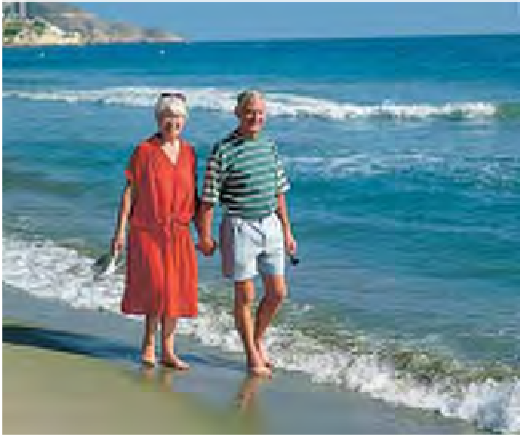Travel Reference
In-Depth Information
Economic factors
Types of visitors
The price paid for a holiday or short break is a major
consideration for British people travelling to European
destinations. Many people buy holidays solely on
price, looking for the cheapest holiday or fl ight on offer
that matches their needs. The introduction of low-cost
airlines has lowered fares across the airline industry
generally and opened up new destinations in Europe
at value-for-money prices. There is a growing trend
for people to put together their own holidays, using
the internet to book travel and accommodation direct
rather than using a travel agent.
Tourist destinations in Europe have to cater for the needs
of a wide variety of UK tourists, from solo travellers and
couples to families and groups of all kinds. Different
customers have very particular needs when it comes
to choosing a holiday or destination. People on solo
holidays tend to look for companionship, while families
with young children seek out resorts that can provide
safe bathing areas, early meals in their accommodation,
a baby-sitting service, baby-changing facilities, play
areas, children's entertainment and activities suitable
for children. People with special needs may need
wheelchair access to accommodation and other
facilities, special diets, easy parking and appropriate
signs. Young people look for destinations that can
offer budget accommodation, cheap food and drink,
opportunities to socialise, good nightlife and reduced
rates for entry to attractions and when travelling
around. Groups look for suitable accommodation that
can accommodate their needs, tour guides and a range
of suitable attractions. Young couples may be attracted
to destinations that offer adventure activities, such as
paragliding and bungee-jumping, while older, retired
couples may be looking for peace and quiet in their
holiday destinations.
Another important economic factor is the cost of living
in a destination, particularly if somebody is taking a
long holiday. Every year the Post Offi ce® carries out
research into the cost of a range of goods in a variety
of European destinations. The data for 2010 shows that
Hungary is the best value of any European destination
for the second year running, with its currency, the forint,
worth over nine per cent less than a year ago. Spain is
the least expensive Eurozone destination for UK tourists,
showing a 30 per cent fall in prices compared to 2009.
This is part of a general trend in Eurozone countries,
which have seen prices fall as a result of exchange rate
fl uctuations. The most expensive destination in the
survey is Turkey, due to the weakening of the Turkish
lira and a general rise in prices for goods and services
in tourist destinations.
Fluctuations in exchange rates can infl uence a UK
traveller's choice of destination. When the pound is
strong against other currencies, it makes travelling to
destinations in Europe less expensive, since British
tourists receive more local currency in exchange.
Conversely, when the pound is weak when compared
to other currencies, travelling to European destinations
becomes more expensive and British people may
decide to go elsewhere for their holiday, e.g. the USA,
or take a holiday in this country.
Older people are an important market segment








































































